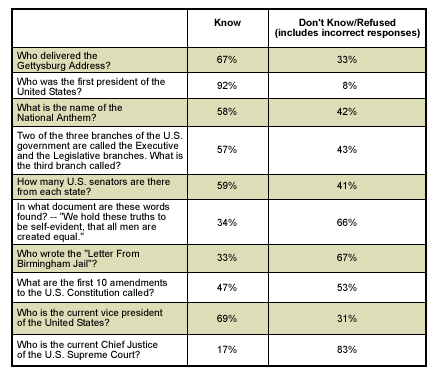Thomas Jefferson, author of the Declaration of Independence and a passionate believer in education as the cornerstone of democracy, once wrote, "If a nation expects to be both ignorant and free in a state of civilization, it expects what never was and never will be." James Madison, known as the "father" of the Constitution, wrote, "A well-instructed people alone can be permanently a free people."
If Jefferson and Madison returned today, they might be alarmed by the widespread ignorance of American history and civics among U.S. citizens. For example, slightly more than half (53%) of Americans do not know that the first 10 amendments to the Constitution of the United States are called the "Bill of Rights." A third of Americans (33%) do not know who delivered the Gettysburg Address. A sizable minority (42%) of Americans do not know the title of the national anthem.
The findings are from a statistically representative national survey that presented respondents with a 10-question quiz on key facts of American history*. The results were presented at the George H. Gallup International Institute "Ideas for Progress" seminar on Oct. 9, Recapturing Our Heritage: Innovative Programs for Enlightened Citizenship. The scores also indicate that four in five Americans (83%) cannot name the current Chief Justice of the Supreme Court, William Rehnquist. Three in 10 (31%) are unable to name the current vice president of the United States, Dick Cheney.

High Marks for College Graduates, Postgrads?
College grads and those with postgraduate degrees are more likely than those with only high school educations to know the answers. At least a majority of college grads know the correct answer on 7 of the 10 questions. However, 7 in 10 college graduates do not know the name of the current Chief Justice, 18% do not know the name of the current vice president, and 3 in 10 (29%) draw a blank when it comes to naming the national anthem.
Variance by Political Bent
In general, Republicans outscored Democrats on most of the 10 questions asked. However, this difference likely results from the fact that Republicans tend to be better-educated than Democrats are. For example, 77% of Republicans know that Abraham Lincoln (a legendary Republican himself) gave the Gettysburg Address, compared to 64% of Democrats and 61% of independents, and 78% of members of the GOP can identify Dick Cheney (also a prominent Republican) as vice president, compared to 65% of Democrats and 64% of independents. There is, however, one question on which both Democrats and independents trumped GOP respondents: 36% of Democrats and 37% of independents identified Martin Luther King Jr., as the writer of the Letter From Birmingham Jail, while just 28% of Republicans could do the same.
Bottom Line
These findings are cause for deep concern. If knowledge of these basic components of American history and civics are lost, then the American system of representative democracy could be lost as well. Dr. Daniel Hart, a presenter at the Gallup Institute seminar and professor of psychology and associate dean at Rutgers University, confirms that civic knowledge is an important ingredient for a healthy democracy. Hart suggests that, "High school seniors who are knowledgeable about American history and government are more likely to become regular voters in young adulthood than are high school students ignorant of the basic facts of civics."
Part II of this series on will focus on how well -- in the view of Americans -- democracy is working.
*Results are based on telephone interviews with 1,008 national adults, aged 18 and older, conducted Aug. 28 through Sept. 15, 2003. For results based on the total sample of national adults, one can say with 95% confidence that the margin of sampling error is ±3 percentage points. In addition to sampling error, question wording and practical difficulties in conducting surveys can introduce error or bias into the findings of public opinion polls.
